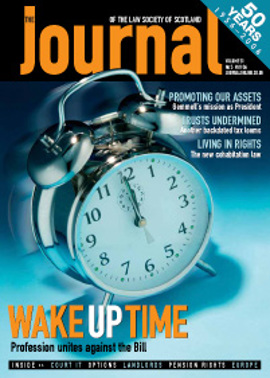Landlords: setting the mark

An estimated third of a million people live in the private rented sector in Scotland, in around 170,000 properties. Most landlords take a professional approach and provide high quality, well-managed accommodation. Some landlords let out hundreds of properties, while the majority only have one property. For some, it’s a business; for others it may simply be an investment while a son or daughter is studying.
So the challenge we face is making sure every type of landlord is aware of – and complies with – their responsibilities.
Registration will make rights and responsibilities clearer for landlords: clear that letting out property is not a quick and easy way to make money without adhering to the law, and that those who exploit poor or vulnerable tenants damage the reputation of private letting.
Registration will make private renting a more attractive option – as a tenancy and as an investment for landlords.
Onus on the owner
From 30 April 2006, all owners of let residential property in Scotland have to register with the local authority in the area in which they let. The duty to register is on the owner of the property, not on any agent or third party. Agents will also be able to register voluntarily, so that landlords know they have already been checked.
As from this date, it is a criminal offence for people to own residential property which is let out if they have not submitted a valid application to their council. Rent could be withheld or prosecution could lead to a fine up to £5,000.
To register someone, the local authority will have to be satisfied that they are a fit and proper person to let property. It will take into account information about past behaviour, including:
- any relevant unspent convictions, particularly in relation to fraud, violence or drugs;
- any evidence that the applicant has failed to take steps to deal with antisocial behaviour in his or her properties;
- any evidence that the applicant has failed to comply with the law relating to housing or letting, including management, money and physical issues;
- any evidence that the applicant has practised illegal discrimination in any business activity.
In making its judgment, the local authority will also take into account any agency arrangement.
Owners will have to give a list of all their let properties and details of agents. Registration will not, however, involve assessment of the property or holding details of tenancies.
Registration made simple
Registration lasts for three years. Landlords who already have an HMO licence will be automatically put on the register. Some properties, such as the only or main residence of the landlord, do not have to be included in the register.
The registration process itself is straightforward. We have provided a central system for local authorities to use and landlords can register online or by contacting the council. This should mean that applications will be handled in a consistent way across the country and will make the process as streamlined as possible for councils and landlords. We have set the fee for registration at £55 per landlord and an additional £11 for every property registered. We estimate that along with the substantial funding we have made available to councils for implementation of the scheme, the fees will cover the running costs.
Registration will allow local authorities to ensure that those who let out property are fit and proper people, but we are also keen that a “light touch” approach is adopted and that applicants are regarded as fit and proper unless there are grounds to suggest otherwise.
In case of difficulty
We do, however, expect local authorities to undertake checks on those landlords where there are doubts or suspicions, before confirming registration. Registration also allows the local authority to act rapidly and in the best interests of tenants if problems emerge after a landlord is registered.
Where this happens, I would expect councils to support the landlord in improving an unsatisfactory situation, but the sanctions have to be available, if necessary, to remove the worst landlords from the sector.
Having a register of private landlords will help local authorities keep in contact with landlords in their area, aiding direct communication on good practice and on initiatives such as landlord accreditation, which is being piloted in four areas across Scotland.
Registration will also establish precise and up to date information about the sector – information that is not available at the moment, but the information we need if we are to make the best policies for the rented sector in Scotland.
Above all, tenants will know that their landlord is adhering to the law, and if that is not the case, councils have sanctions in place to take action.
Johann Lamont, Deputy Communities Minister, Scottish Executive
In this issue
- Stand up to be counted
- A bill to divide us
- The pendulum swings
- The pendulum swings (1)
- Cohabitation: the new legal landscape
- The tax man cometh (again)
- The foreign legion
- Making IT happen
- Apportioning and sharing
- Property problems
- Still a profession
- Arguing over agreements
- Next generation law
- Lawyers in the transfer market
- Scottish Solicitors' Discipline Tribunal
- Landlords: setting the mark
- Website review
- Book reviews
- Purchase options in leases






